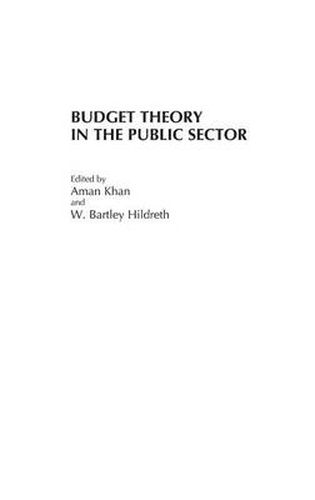Readings Newsletter
Become a Readings Member to make your shopping experience even easier.
Sign in or sign up for free!
You’re not far away from qualifying for FREE standard shipping within Australia
You’ve qualified for FREE standard shipping within Australia
The cart is loading…






Opens new areas of inquiry into the art and skill of public sector budgeting, and sees it as an institutional process, decision making tool, and–when well done–a reflection of managerial efficiency. Dominated by multiple, competing, and occasionally overlapping theories, the act of budgeting is by no means a staid, dispiriting task. Kahn, Hildreth, and their group of scholars and practitioners show that budgeting is an institutional process, an incremental decision-making tool, and when correctly applied becomes a tribute to managerial and administrative efficiency. Taken together, the chapters provide an unusually coherent conceptual foundation for budgeting as a legitimate field of study, and demonstrate yet again that in its current state the field is truly eclectic but compartmentalized. They also show why it is so difficult to come up with one unified theory of budgeting–and that is one of the book’s major benefits. It opens new areas of inquiry that, in the opinion of Khan, Hildreth, and others, will generate renewed interest in probing the field’s theory and applications. Understandable and readable for those with limited knowledge of the subject but needing a sufficiently useful grasp of its various issues and problems, the book is both an important reference work for scholars in the field and a practical guide for students of administration, their teachers, and for managers throughout the public sector.
$9.00 standard shipping within Australia
FREE standard shipping within Australia for orders over $100.00
Express & International shipping calculated at checkout
Opens new areas of inquiry into the art and skill of public sector budgeting, and sees it as an institutional process, decision making tool, and–when well done–a reflection of managerial efficiency. Dominated by multiple, competing, and occasionally overlapping theories, the act of budgeting is by no means a staid, dispiriting task. Kahn, Hildreth, and their group of scholars and practitioners show that budgeting is an institutional process, an incremental decision-making tool, and when correctly applied becomes a tribute to managerial and administrative efficiency. Taken together, the chapters provide an unusually coherent conceptual foundation for budgeting as a legitimate field of study, and demonstrate yet again that in its current state the field is truly eclectic but compartmentalized. They also show why it is so difficult to come up with one unified theory of budgeting–and that is one of the book’s major benefits. It opens new areas of inquiry that, in the opinion of Khan, Hildreth, and others, will generate renewed interest in probing the field’s theory and applications. Understandable and readable for those with limited knowledge of the subject but needing a sufficiently useful grasp of its various issues and problems, the book is both an important reference work for scholars in the field and a practical guide for students of administration, their teachers, and for managers throughout the public sector.